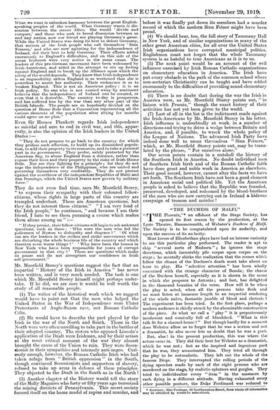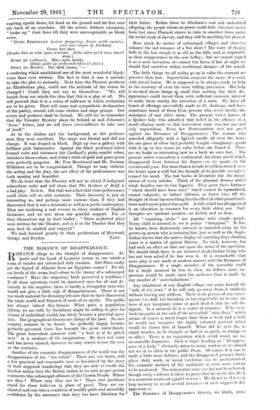" THE DUCHESS OF MALFL"
"THE Phoenix,"* an offshoot of the Stage Society, has opened its first eeason by the production, at the Lyric Theatre, Hammersmith, of Webster's Duchess of Malfi. The Society is to be congratulated upon its audacity, and upon the success of its audacity.
Most lovers of Elizabethan plays have had an intense curiosity to see this particular play performed. The reader is apt to skip " several sorts of Madmen " ; he ignores the stage directions, which inexorably pile corpse upon corpse on the stage ; he mentally shirks the realization that the scenes which follow the climax of the Duchess's death must take about an hour to play. His " selective attention " has been wholly concerned with the strange character of Bosola ; the charm of the Duchess herself, especially as it is shown in the scene in which she proposes to Antonio ; and last, has delighted in the thousand beauties of the verse. How will it be when the play is acted, when all the persons take flesh and we must listen at immense length to an impartial rendering of the whole naive, fantastic jumble of blood and rhetoric ? The experiment has been tried. In the first place, perhaps a modern audience is chiefly struck by the abominable construction of the piece. As what we call a " play " it is preposterously incoherent and comically full of bloodshed. " What is this talk fit for a charnel-house " But though hardly for a moment does Webster allow us to forget that he was a sexton and not a dramatist, he also never lets us doubt that he was a poet.
But, alas ! in the present production, this was where the actors came in. They did their best for Webster as a dramatist, which he was not ; but as the inspired and ingenious poet that he was, they assassinated him. They tried all through the play to be naturalistic. They left out the whole of the famous Dirge. They interrupted the rolling periods of the dying speeches made by each of the eight persons who are murdered on the stage, by realistic splutters and gurgles. They tried to individualize every " item " in the massacre by each dying in a different attitude. Having exhausted every other possible posture, the Dulte Ferdinand was reduced to
• Secretary, Miss Fredman, 36 Southampton Street, from whom all Information may be obtained by would-be subscribers.
expiring upside down, his head on the ground and his feet over the back of an armchair. All the actors, without exception, " broke up " their lines till they were unrecognizable as blank verse.
" DIIKE FERDMTAND (enters staggering, draws aside curtain,
and sees corpse of Duchess).
Cover her face.
(Bartok does so with spare overcoat. Duke takes quick turn round stage.)
Dram (to audience). Mine eyes dazzle.
(Duke pulls up socks and tidies his hair.)
Dula (to Bosola). She died young "-
a rendering which annihilated one of the most wonderful blank- verse lines ever written. The fact is that it was a mistake to take the plot so seriously. Next time the Phoenix produces an Elizabethan play, could not the attitude of the actors be changed ? Could they not say to themselves : " We will banish from our minds the idea that this is a play at all. We will pretend that it is a series of tableaux in which recitations are to be given. First will come real sympathetic declamation
of the poetry, second will come clothes and stage groups. Our action and postures shall be formal. We will try to remember that the Townley Mystery plays lie behind us and Johnson's Irene' before, and we will leave vraisemblance to take care
of itself."
As to the clothes and the background, at this perform- ance they were excellent. The stage was formal and did' not change. It was draped in black. High up was a gallery with brilliant pink balustrades. Against the black archways which formed exits and entrances the Cardinal's pinky-scarlet robes, Antonio's flame-colour, and Julia's cloth-of-gold and grass-green were perfectly gorgeous. Mr. Tom Heselwood and Mr. Norman Wilkinson are to be congratulated. Though we may criticize the acting and the play, the net effect of the performance was both moving and beautiful.
We do trust that the Phoenix will not be afraid if indignant
subscribers write and tell them that The Duchess of Malfi is a bad play. So it is. But that was a fact that their performance
could alone tell us with certainty. Their discovery is just as interesting as, and perhaps more curious than, if they had discovered that it was a dramatic as well as a poetic masterpiece. They are rendering a real service to every student of English literature, and we owe them our grateful support. For as they themselves say in their leaflet : " These neglected plays were written for the Theatre, and it is in the Theatre that they may best be studied and enjoyed."
We look forward greatly to their productions of Heywood,











































 Previous page
Previous page